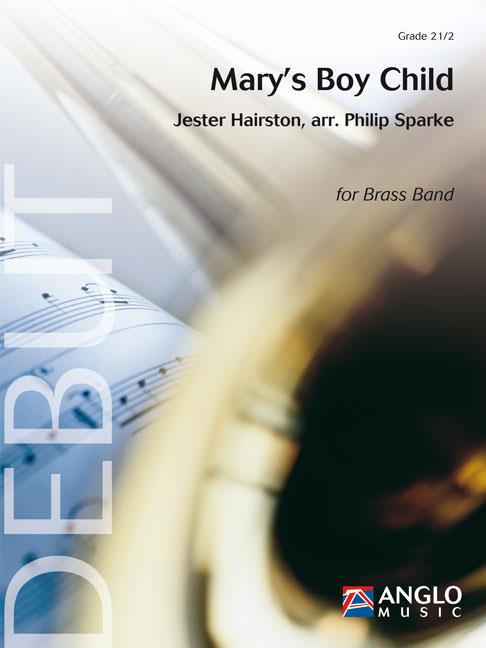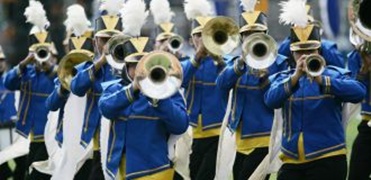Results
-
 £57.50
£57.50Mary's Boy Child (Brass Band - Score and Parts) - Hairston, Jester - Sparke, Philip
Philip Sparke has taken this traditional melody and produced an attractive arrangement for brass band. The piece is ideal for use in Christmas concerts and is guaranteed to get everyone's toes tapping - players and audience alike.Duration: 4.30
Estimated dispatch 7-14 working days
-
£10.00
Isaiah 40 (Brass Band - Study Score) - Redhead, Robert
Commissioned for the final of the 1996 National Brass Band Championships of Great Britain. The timeless truths contained in Isaiah 40 were written to encourage a people facing very intimidating circumstances. The Jewish people of the 5th Century BC were preparing to make an arduous journey though the desert to return to their ravaged homeland after a lengthy exile in the sophisticated society of Babylon. Both Scripture and music sound out a message of hope, as they view life from an eternal perspective, thus placing change in its proper context. Because 'the Lord is the everlasting God' his word 'stands forever' and 'those who hope in the Lord will renew their strength'. They will not merely get through somehow but 'they will soar on wings like eagles'.
Estimated dispatch 7-14 working days
-
 £54.99
£54.99Rock About (Brass Band - Score and Parts) - Gines, Frede
Rock About is an eight part work in which parts can be distributed according to the players available. The light pieces are full of joy and are sure to make your audience want to get up and dance!Duration: 3:20
Estimated dispatch 7-14 working days
-
 £35.00
£35.00BLUES ON THE MARCH (Brass Band) - Barry, Darrol
Traditional marches are great, but sometimes you want something different to kick off your concert. This piece gives your band a chance to get into the 'swing' of things, based on the traditional twelve bar blues it features a contrasting middle section with a trombone trio and a flugel (cornet) obligato. Grade: 4th section +. Duration: 3:50
Estimated dispatch 7-14 working days
-
 £58.60
£58.60BREEZIN' DOWN BROADWAY! (Brass Band) - Richards, Goff
Medium - Includes: Another Opening, Another Show; There's No Business Like Show Business: Get Me To The Church On Time; Oklahoma!; That's Entertainment; Seventy Six Trombones.
Estimated dispatch 7-14 working days
-
 £44.95
£44.95INSTANT CONCERT (Brass Band) - Walters, Harold
A collection of 32 melodies which come fast and furious - and sometimes two or three at once.Your audience's smile will just get bigger and bigger as the piece progresses.One of the best all time light hearted finishers for any concert - easily playable by youth and fourth section bands upwards.
Estimated dispatch 7-14 working days
-
£59.99
Laudatio (Brass Band - Score and Parts)
This piece was commissioned by a brass band from the Jura in Switzerland to thank its resigning conductor for his loyalty and work. The first and last sections of this composition develop a joyful and highly energetic theme which expresses the complete commitment required of a conductor in order to get the best out of the musicians. The central passage mirrors an atmosphere full of nostalgia. After so many years of intense and relentless work, it is always difficult for a keen conductor to retire. 06:15
Estimated dispatch 7-14 working days
-
 £59.99
£59.99Marching Blues (Brass Band - Score and Parts)
Marching Blues was written in the blues and swing-jazz style of the great big bands. It is an ideal show march that can be used for encores, popular performances, family concerts and much more. As an added entertaining feature why not get your Eb bass player to stand for his/her 28-bar solo! From small ensembles to large bands, Marching Blues will bring great joy to all generations of performers and audiences on many occasions. 04:00
Estimated dispatch 7-14 working days
-
£59.99
Simply Rock! (Brass Band - Score and Parts)
In Simply Rock! Rob Ares has produced a lively, refreshing and modern work. This piece will hold the attention of both the musicians and the audience as the melodies are linked by a compelling accompanying motif which will encourage you to get up and dance. This work truly is a solid piece of rock ! 03:00
Estimated dispatch 7-14 working days
-
 £59.99
£59.99Soul Time (Brass Band - Score and Parts)
Soul Time by Roland Kernen has the two most important elements of any hit pop song - a driving rhythm and an attractive and catchy melody. This work has a three-part structure - a lively and exciting opening, a more peaceful middle section and an exuberant reprise. Get into the groove with this soulful work for brass band. 03:43
Estimated dispatch 7-14 working days
